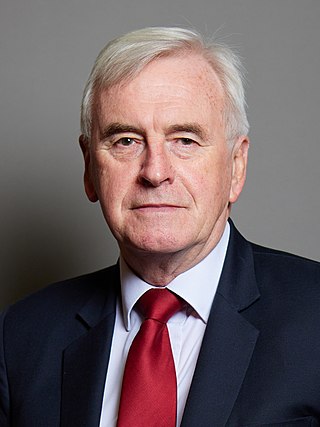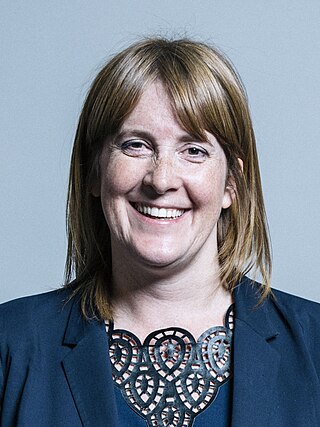
James Keir Hardie was a Scottish trade unionist and politician. He was a founder of the Labour Party, and was its first parliamentary leader from 1906 to 1908.

The Labour Party Conference is the annual conference of the British Labour Party. It is formally the supreme decision-making body of the party and is traditionally held in the final week of September, during the party conference season when the House of Commons is in recess, after each year's second Liberal Democrat Conference and before the Conservative Party Conference. The Labour Party Conference opens on a Sunday and finishes the following Wednesday, with an address by the Deputy Leader of the Labour Party; the Leader's address is usually on the Tuesday. In contrast to the Liberal Democrat Conference, where every party member attending its Conference, either in-person or online, has the right to vote on party policy, under a one member, one vote system, or the Conservative Party Conference, which does not hold votes on party policy, at the Labour Party Conference, 50% of votes are allocated to affiliated organisations, and the other 50% to Constituency Labour Parties, but all voting in both categories is restricted to nominated representatives. Conference decisions are not binding on the party leadership, even if carried unanimously.

John Martin McDonnell is a British politician who served as Shadow Chancellor of the Exchequer from 2015 to 2020. He has been the Member of Parliament (MP) for Hayes and Harlington since 1997, representing the Labour Party until the whip was withdrawn and his suspension on 23 July 2024 as a result of voting to scrap the two child benefit cap. On the political left, McDonnell is a member of the Socialist Campaign Group.

The Electoral Reform Society (ERS) is an independent advocacy organisation in the United Kingdom which promotes electoral reform. It seeks to replace first-past-the-post voting with proportional representation, advocating the single transferable vote, and an elected upper house of Parliament. It is the world's oldest still-extant electoral reform campaign.

The Labour Campaign for Electoral Reform (LCER) is an organisation formed of members and supporters of the British Labour Party, who are interested in issues of democratic renewal and electoral reform.

SirKeir Rodney Starmer is a British politician who has served as the Prime Minister of the United Kingdom since 2024 and as Leader of the Labour Party since 2020. Previously serving as the Leader of the Opposition from 2020 to 2024, he has represented Holborn and St Pancras as its Member of Parliament (MP) since 2015, having previously been Director of Public Prosecutions from 2008 to 2013.

The leader of the Labour Party is the highest position within the United Kingdom's Labour Party. The current holder of the position is Prime Minister of the United Kingdom, Keir Starmer, who was elected to the position on 4 April 2020, following his victory in the party's leadership election.
The Labour Party is a political party in the United Kingdom that sits on the centre-left of the political spectrum. In a broader sense, the party has been described as an alliance of social democrats, democratic socialists and trade unionists. It is the governing party of the United Kingdom, having won the 2024 general election, and is currently the largest political party by number of votes cast and number of seats in the House of Commons. There have been seven Labour prime ministers and fourteen Labour ministries. The party traditionally holds the annual Labour Party Conference during party conference season, at which senior Labour figures promote party policy.
Electoral reform is a change in electoral systems which alters how public desires are expressed in election results.

Andrew Joseph McDonald is a British Labour Party politician and solicitor serving as Member of Parliament (MP) for Middlesbrough and Thornaby East since 2012.

Richard Burgon is a British politician who has been the Member of Parliament (MP) for Leeds East since 2015. Burgon served as Shadow Secretary of State for Justice and Shadow Lord Chancellor in the Shadow Cabinet of Jeremy Corbyn from 2016 to 2020. A Labour Party MP, on 23 July 2024 he had the whip withdrawn and was suspended from the party for six months as a result of voting for a Scottish National Party amendment to scrap the two child benefit cap. He now sits as an Independent MP until the whip is re-established, subject to a review.

Rebecca Roseanne Long-Bailey is a British independent, formerly Labour Party politician and solicitor who has been Member of Parliament (MP) for Salford, previously Salford and Eccles, since 2015. She served in the Shadow Cabinet under Jeremy Corbyn, first as Shadow Chief Secretary to the Treasury from 2016 to 2017 and then as Shadow Business Secretary from 2017 to 2020. Under Keir Starmer, she served as Shadow Education Secretary for only two months in 2020.

Make Votes Matter is a political pressure group based in the United Kingdom which campaigns for replacing the first-past-the-post voting system with one of proportional representation for elections to the British House of Commons.

Sarah Ann Jones is a British Labour Party politician who has been Member of Parliament (MP) for Croydon West, formerly Croydon Central, since 2017 and Minister of State for Industry since July 2024.

Federalism in the United Kingdom aims at constitutional reform to achieve a federal UK or a British federation, where there is a division of legislative powers between two or more levels of government, so that sovereignty is decentralised between a federal government and autonomous governments in a federal system.
The 2020 Labour Party leadership election was triggered after Jeremy Corbyn announced his intention to resign as the leader of the Labour Party following the party's defeat at the 2019 general election. It was won by Keir Starmer, who received 56.2 per cent of the vote on the first round and went on to become Prime Minister after winning the 2024 general election. It was held alongside the deputy leadership election, in which Angela Rayner was elected to succeed Tom Watson as deputy leader after Watson retired from Parliament in November 2019, in advance of the election.
The political positions of Keir Starmer, the Prime Minister of the United Kingdom since 2024 and Leader of the Labour Party since 2020, have frequently changed. Views of his political philosophy are diverse.

Keir Starmer served as Leader of the Opposition from April 2020, following the resignation of Jeremy Corbyn after Labour's defeat at the 2019 general election and Starmer's election as Labour leader in the ensuing leadership election, until his party won a landslide victory at the 2024 general election in July 2024. During his tenure, Starmer moved Labour toward the political centre and emphasised the elimination of antisemitism within the party.

Keir Starmer's tenure as Prime Minister of the United Kingdom began on 5 July 2024 when he accepted an invitation from King Charles III to form a government, succeeding Rishi Sunak of the Conservative Party. As prime minister, Starmer is serving concurrently as First Lord of the Treasury, Minister for the Civil Service, and Minister for the Union.














